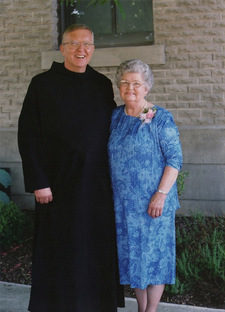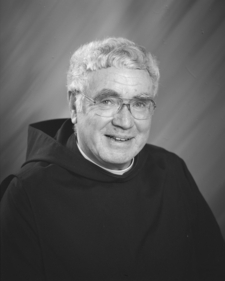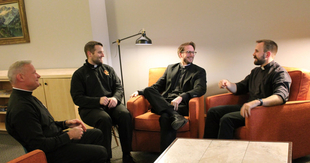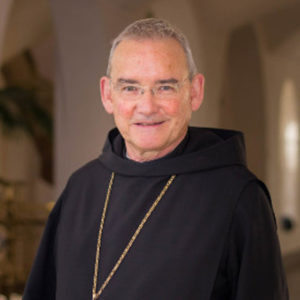 A message from Abbot Jeremy
A message from Abbot Jeremy
The Church has been much in the news in recent weeks, in ways that simply break our hearts. It is important to acknowledge that we are in the midst of a terrible crisis. Innocent victims have suffered the abuse of clergy, and some have suffered again when bishops failed to act. Such evil must be named, investigated, and brought to light. As our Lord promised, the truth will set us free.
My friends, a huge struggle begins whenever someone seriously undertakes to follow Christ, “to walk by the Spirit,” as the Apostle Paul writes (Galatians 5:16-25). This is what all of us are doing together, those of us here at Mount Angel Abbey and Seminary, and all those who have shown in so many ways that they love and support our mission.
We in the Church in this country are under a cloud. This is a season for penitent reflection as we seek to understand the nature of the problem as profoundly as possible. St. Paul helps us see that we all are at risk, all are engaged in the same struggle. The guilt and sin of any one of us affects the whole body.
By the same token, the holiness and virtue of any one of us also belongs to the whole body. If we want to contribute to the healing of the Church, in this time of crisis, we must reject the temptation to turn away from our Lord, and take up instead by the mercy of God the fruit of the Spirit: love, joy, peace, patience, kindness, generosity, faithfulness, gentleness, self-control. These marvelous gifts can seem beyond our reach if we think they must be rooted in our own efforts. Instead, they are freely given by God through the Holy Spirit because we “belong to Christ Jesus.”
It takes courage to persist in our faith at this time. It takes courage for monks and seminarians to risk a life of devotion to our Lord’s Church. It takes courage for our friends to stand with us, to pray with us. But more than courage is needed. All these gifts of the Spirit are needed, and we are begging God for these gifts in all our prayers and at the Eucharistic table.
This is how I spoke to our seminarians in my homily at the Mass of the Holy Spirit on August 27, which inaugurated our school year at Mount Angel. I invite you to listen to my message to them.
At times, when we do something courageous, we can become afraid. Jesus offers a solution to that. He comes to those who are afraid. In the Gospel of John, we learn that the disciples were gathered in fear on the very day of Christ’s resurrection. Their doors were locked. This is us right now, in this Church. We are the disciples, afraid, seeking courage.
And “Jesus came and stood in their midst and said to them, ‘Peace be with you.’” To us right now, He shows His wounds and then He says again, “Peace be with you” (John 20:19-23).
Christ’s peace is not a peace of passivity. It is a peace that calls us to serve Him, His Church, and our brothers and sisters. This is a time when Satan – named in Scripture “Father of Lies” – can wreak havoc on our souls and feast on our doubts. Again in the Gospel of John, Christ promises if we continue in His word, we will know the truth and the truth will set us free.
Let us remember Christ’s promise to us in the coming weeks, months, and years, as we seek the truth. In 2004 the Bishops of the United States commissioned an independent study by the John Jay Institute for Criminal Justice so that we might understand the nature and scope of child abuse in the Church. Now there are calls within the Church for further investigations, as we seek to understand our situation together, in honesty and humility.
Here at Mount Angel, we deeply value your trust and work sincerely to deserve it. I invite you to review online a statement that outlines the steps we at Mount Angel Abbey and Seminary have taken since 2002 to ensure a safe environment for children and young people. All monks and seminarians in formation participate in rigorous human, spiritual, academic and pastoral formation as they mature and embrace a life and lifestyle of celibacy and chastity, leadership and responsibility, service and accountability. Their readiness is thoroughly evaluated before they are ordained or make their profession of vows.
What more is to be done? Every member of Christ’s body has a vital role to play as we seek to heal and strengthen His Church.
We monks of Mount Angel will continue the way of life that Benedictines have followed for 1,500 years. We continue to pray six times a day for the life of the world. We continue to greet guests as Christ. We continue to nurture the healthy formation of our future priests. We offer this peaceful hilltop as a place of spiritual growth and refuge for all seekers. We pray that the simple order and beauty of the Abbey will serve as a beacon of light, hope and healing for you and our extended community.
We will continue to ask our friends to support us, in all the ways they have supported us in the past. With even greater urgency, we ask our broad community to pray for vocations and to support the formation of monks and priests who will serve our Lord’s Church. The people of God need and deserve to be guided by mature and holy shepherds.
I urge you in this time to draw nearer to Christ and His Church. Come to the Abbey. Pray with us. Celebrate Mass with us. Let our seminarians know that the vocation they are undertaking is holy and necessary. Let us encourage one another! Please, send us your prayer requests. We pray for you daily.
Christ’s peace be with you,

Abbot Jeremy Driscoll, O.S.B.
Chancellor of Mount Angel Seminary
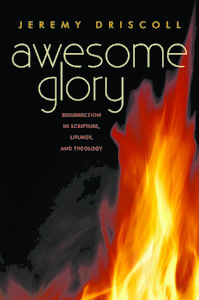 Resurrection means going deep.
Resurrection means going deep.
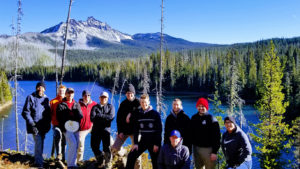 Mount Angel seminarians have always been attracted to hiking and other outdoor pursuits. So it was natural for current seminarians, inspired by the life and spirituality of Blessed Pier Giorgio Frassati, to form a fellowship group devoted to seeking God in the wilderness.
Mount Angel seminarians have always been attracted to hiking and other outdoor pursuits. So it was natural for current seminarians, inspired by the life and spirituality of Blessed Pier Giorgio Frassati, to form a fellowship group devoted to seeking God in the wilderness.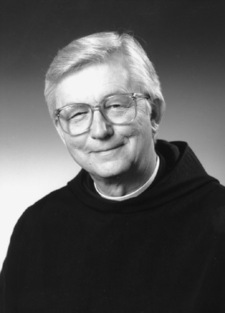 FATHER BENEDICT SUING, O.S.B., a monk of Mount Angel Abbey in Oregon, U.S.A., passed peacefully to the Lord on the 7th day of December 2018, in the 93rd year of his life, the 70th year of his monastic profession, and the 65th year since his ordination to the priesthood.
FATHER BENEDICT SUING, O.S.B., a monk of Mount Angel Abbey in Oregon, U.S.A., passed peacefully to the Lord on the 7th day of December 2018, in the 93rd year of his life, the 70th year of his monastic profession, and the 65th year since his ordination to the priesthood.